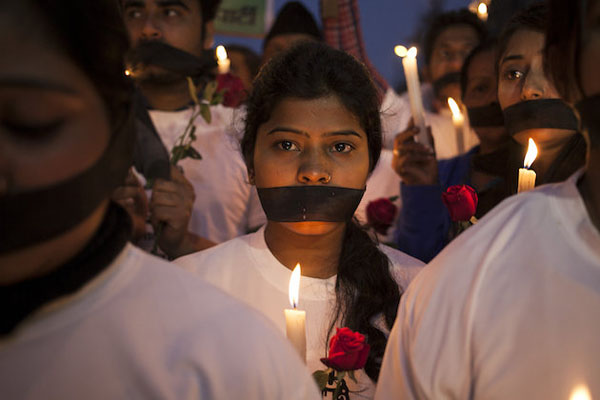Freedom of expression has come under attack in three of the world’s largest nations, sparking protest and drawing attention to the very issues each of the respective governments want swept under the proverbial rug. Let’s start in India where New Delhi Television was to have broadcast Leslee Udwin’s India’s Daughter yesterday, International Women’s Day. Last week, the Indian government banned the documentary on the gang rape on a Delhi bus in 2012 that resulted in the death of Jyoti Singh, a 23-year-old medical student. As Patrick Frater reports for Variety, the upper house of parliament cited the film’s “‘objectionable content’ and said its screening ‘would damage India’s reputation abroad.'” Whereas the ban leaves it intact?
On Thursday, Sonia Faleiro reported in the Guardian that “parliamentary affairs minister M. Venkaiah Naidu described the film as ‘an international conspiracy.'” Naidu’s allegation is bewildering, given that the film reveals little that is new either about the crime, or the mindset of the man convicted of it,” a reference to bus driver Mukesh Singh, one of the six men who raped, beat and killed Jyoti Singh. “A whining Singh comes off as genuinely unconvinced that he should be in jail. ‘She should just be silent and allow the rape,’ says Singh, implying that if Jyoti had only done the right thing and let the men take from her what was theirs—her body—she would still be alive today.”
You can watch an unembeddable copy of India’s Daughter here.
To China. Chai Jing’s Under the Dome, “a searing documentary about China’s catastrophic air pollution, had hundreds of millions of views on Chinese websites within days of its release,” reports Edward Wong for the New York Times. “The country’s new environment minister compared it to Silent Spring, the landmark 1962 book that energized the environmental movement in the United States…. Then on Friday afternoon, the momentum over the video came to an abrupt halt, as major Chinese video websites deleted it under orders from the Communist Party’s central propaganda department.”
The Guardian‘s Ben Beaumont-Thomas: “An interview with Jing on the website of central news organization People’s Daily has also been removed along with a posting of the film itself, and earlier last week there had been directives to media prohibiting reporting on it.”
Meanwhile, in Putin’s Russia: “A Charlie Hebdo-style protest demanding the release of detained Ukrainian director Oleg Sentsov is due to take place at an upcoming film festival in Prague, with other initiatives designed to raise awareness about his situation planned for other European film festivals this spring, according to organizers.” Nick Holdsworth for the Hollywood Reporter: “Sentsov is facing up to 17 years in prison on terrorism charges that he denies, after being arrested at his home in Crimea by Russian secret service agents last year. He has now been held for nine months without trial in Lefortovo, an old KGB prison in Moscow.”
Variety‘s Leo Barraclough reports that the Polish Film Academy “has added its voice to the campaign.” In June, Pedro Almodóvar, Ken Loach, Béla Tarr and Wim Wenders co-signed a letter of protest addressed to Russian authorities. Below, a statement from Sentsov and a trailer for his 2011 film, Gaamer:
For news and tips throughout the day every day, follow @KeyframeDaily. Get Keyframe Daily in your inbox by signing in at fandor.com/daily.




